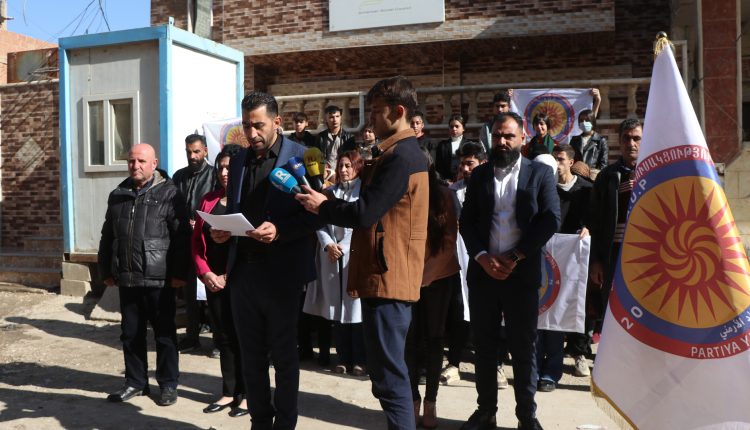Armenian Party Demands Inclusion in Syria’s National Conference
By Kardo Roj
HASAKAH, Syria (North Press) – The Armenian Union Party in Syria has urged the new government in Damascus to include Armenian representation in the upcoming national conference, calling for recognition of their historical role and rights in the country.
In a statement on Thursday, Imad Tetrian, Secretary-General of the Armenian Union Party, emphasized that Armenians have always been an integral part of Syria’s social fabric and should not be considered a minority in the political discourse.
“We reject the term ‘minority’ that has recently been used in Syria,” Tetrian told North Press. “Every community living on Syrian soil is a fundamental part of the nation. The Armenian people have deep roots in Syria and have never been a minority.”
Key Demands from the Armenian Community
Tetrian outlined several demands that the Armenian Union Party believes should be addressed in Syria’s new constitution and political framework:
- Official recognition of the Armenian language as part of Syria’s national educational curriculum.
- Guaranteed parliamentary representation for the Armenian community.
- Full citizenship rights for Armenians still considered “foreigners” under Syria’s existing legal system.
- Inclusion in the upcoming national dialogue conference in Damascus to ensure all ethnic and religious communities participate in shaping Syria’s future.
“If this is truly a ‘Syrian National Conference for Dialogue,’ then all components of Syrian society must be invited to participate—without exclusion,” Tetrian insisted.
Historical Marginalization and the Call for Change
Tetrian criticized past Syrian governments for marginalizing Armenian culture and language, stating that previous regimes allowed only private Armenian schools while refusing to integrate Armenian heritage into the national curriculum.
“The former regime actively sidelined Armenian culture. While some private schools existed, the Armenian language was never officially accepted as part of Syria’s educational system,” he explained.
Additionally, Tetrian raised concerns about stateless Armenians in Syria, many of whom have remained without Syrian nationality since the controversial 1962 census, which left tens of thousands of people—primarily Kurds—without official citizenship.
“We must avoid repeating the mistakes of the past. The new Syrian government must guarantee full citizenship for all Armenians and other marginalized communities,” he stated.
Security Concerns and the Armenian Genocide Legacy
The Armenian community in Syria also expressed concerns about security threats from Turkey and Azerbaijan, which Tetrian described as historical enemies of the Armenian people.
“Recognizing Armenian identity and protecting Armenian communities is essential to preventing future acts of genocide,” he asserted. “Turkey and Azerbaijan continue to threaten Armenian existence in the region, and Syria must ensure we are safeguarded from any form of persecution.”
A Test for Syria’s New Government
The Armenian Union Party’s demands highlight the larger challenge facing Syria’s transitional leadership: how to ensure representation and equal rights for all ethnic and religious groups in the country’s post-war governance.
The national conference in Damascus is expected to lay the groundwork for a new Syrian political structure, but it remains unclear whether minority groups—including Armenians, Kurds, Assyrians, and others—will be given an equal seat at the table.
Tetrian concluded with a direct call to the new Syrian leadership:
“The responsibility of the Syrian government is to protect all communities, prevent exclusion, and build a truly inclusive state. We refuse to be sidelined once again.”
As Syria embarks on a political transition, the coming weeks will reveal whether the government is willing to embrace a genuinely pluralistic model—or risk repeating the mistakes of the past.

